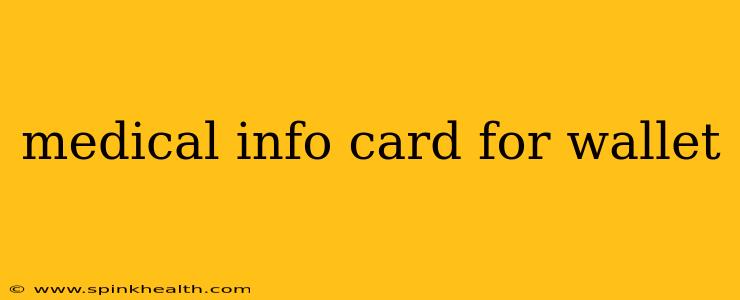The Ultimate Guide to Medical Info Cards for Your Wallet: Peace of Mind in Your Pocket
Let's be honest, nobody wants to think about medical emergencies. But having a readily available medical information card in your wallet can be the difference between a smooth, efficient response and a stressful, potentially dangerous delay. This isn't just about convenience; it's about safeguarding your health and well-being – and the peace of mind that comes with knowing you're prepared.
This comprehensive guide will walk you through everything you need to know about creating and carrying a medical information card, addressing common questions and concerns along the way.
What Information Should Be Included on My Medical Info Card?
This is the most crucial aspect. Think of it as a concise, easily readable summary of your vital medical details. Here's what you should include:
- Full Name and Date of Birth: Seems obvious, but essential for quick identification.
- Allergies: List ALL allergies, including reactions (e.g., "Penicillin: Anaphylaxis"). Be specific!
- Medications: Include current prescriptions and dosages. Don't forget over-the-counter medications you take regularly.
- Medical Conditions: Chronic illnesses like diabetes, heart conditions, epilepsy, etc., should be clearly stated.
- Emergency Contacts: At least two contacts with phone numbers. Ideally, include relationships (e.g., "Mother, Jane Doe").
- Blood Type (if known): This can be invaluable in emergency situations.
- Doctor's Name and Phone Number: Having this readily available can help first responders get critical information quickly.
- Insurance Information: Include your provider's name and policy number. While not always accessible in an emergency, this can aid in later processing.
What is the Best Format for a Medical Wallet Card?
There's no single "best" format, but aiming for clarity and durability is key. Several options exist:
- Pre-made Cards: Many pharmacies and online retailers sell pre-printed medical alert cards. These offer convenience but might not offer the flexibility to include all your necessary information.
- DIY Laminated Card: Creating your own allows for complete customization. Print your information clearly, then laminate the card for durability. This is a cost-effective and easily customizable option.
- Digital Medical ID: Several apps allow you to store your medical information digitally, accessible through your smartphone's lock screen. While convenient, this relies on having your phone readily accessible, which isn't always guaranteed in an emergency.
Should I Include My Social Security Number on My Medical Info Card?
No. Your Social Security Number is sensitive personal information and should not be included on a readily visible medical card. The risks of identity theft outweigh any potential benefits.
How Often Should I Update My Medical Information Card?
Regular updates are vital. Review and update your card at least annually, or whenever there are changes to your medications, allergies, or medical conditions. This ensures the information remains accurate and helpful.
Where Should I Keep My Medical Information Card?
Keep it in your wallet, purse, or a readily accessible location. Consider carrying a duplicate in your car or with a trusted family member or friend. Being proactive is paramount.
Are there any alternatives to carrying a physical card?
While a physical card offers immediate accessibility, digital options provide alternatives:
- Medical ID Apps: These apps store your information digitally and may even provide emergency services with access to your data. However, remember to ensure the app has the right privacy and security measures in place.
- Smartwatches with Medical ID features: Some smartwatches offer similar functionality, directly displaying crucial medical information upon unlock.
By taking the time to create and maintain an accurate medical information card, you are taking a proactive step towards ensuring your safety and well-being. It's a small investment with potentially significant returns, providing peace of mind and potentially life-saving assistance in times of need.

